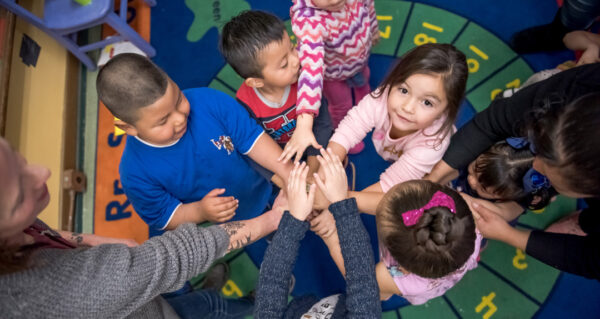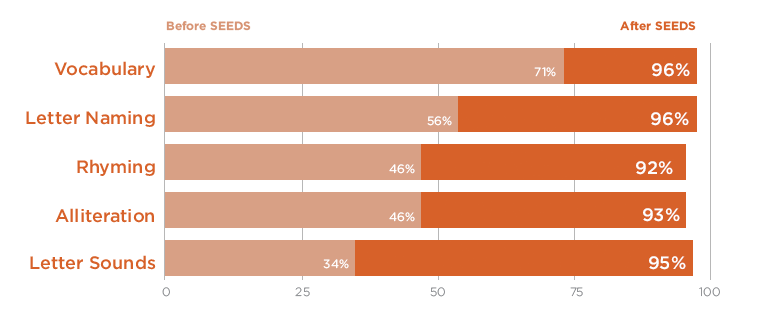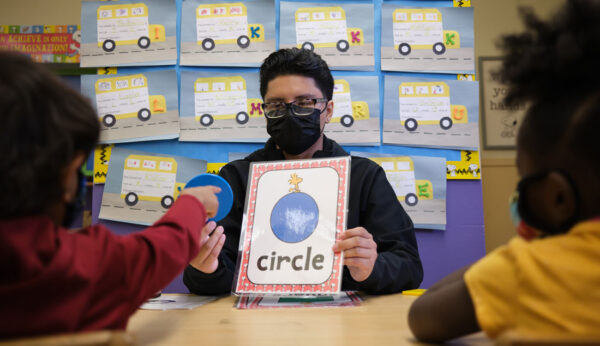After the immediate success of SEEDS of Learning in Transitional Kindergarten (TK), we found that to maintain a child’s learning trajectory to third grade, literacy instruction and intervention in kindergarten through second grade (K-2) had to improve. In partnership with Oakland Unified School District, Education for Change Public Schools and Aspire Public Schools, pilot initiatives were designed and launched in 2017 to bolster instruction and intervention in early literacy development. These systems-level initiatives involved adopting curriculum and assessment, staffing literacy directors and coaches within each organization, staffing part-time literacy tutors in K-2 classrooms and funding literacy nonprofits to expand school systems’ training and coaching capacity.
In the first year of the pilot, the percentage of Education for Change kindergartners ready for first grade jumped from 30% to 75%. The percentage of first graders ready for second grade grew 12% in its first year.
The SEEDS of Learning and Early Literacy Kings initiatives fall under our Elementary System Grants, which will sunset in 2026. Read more about these two initiatives below.

SEEDS of Learning
Children learn through relationships, which is why we need to invest in the adults who interact with them. SEEDS of Learning is a relationship-based professional development program that provides educators, parents and caregivers with strategies to build social, emotional, language and literacy skills in young children so they are ready to succeed in kindergarten. Early Development Instrument results from 2020 showed that only 44% of students entered kindergarten ready, so the need for a strong and comprehensive support program is clear.
The Kenneth Rainin Foundation initially funded the implementation of SEEDS of Learning in transitional kindergarten classrooms throughout Oakland as a system-level investment. During the pilot year in 2014, more than 60 pre-kindergarten and transitional kindergarten teachers participated in a summer training and nine months of ongoing professional development and coaching. The results were astounding—in SEEDS transitional kindergarten classrooms, 30% more Oakland children were on target to be successful readers compared to students with teachers who did not participate in SEEDS of Learning.
The chart below shows the percentage of Oakland children in 2017-18 SEEDS classrooms who progressed to be near, at or above targets for key skills that are predictive of school readiness.

The Foundation launched its Elementary System Grants in 2017 to improve K-2 literacy instruction and intervention. Over time, our investments helped SEEDS of Learning grow into FluentSeeds, a national literacy building nonprofit, and aided in the merger of FluentSeeds with Collaborative Classroom, the permanent home of SEEDS of Learning. Visit the Collaborative Classroom website to learn more about SEEDS of Learning.
Early Literacy Kings
Through our Elementary System grantmaking and SEEDS of Learning initiative, we recognized the need for a healthy teacher and tutor workforce. With fewer people entering the traditional teacher certification pathway, school systems partnered with families in an entirely new way. Family members and neighbors received training and coaching to provide evidence-based interventions to students daily. Aside from the literacy gains students experienced, the qualitative value of diversifying the ethnic and linguistic representation of adults in the classroom was significant. Oakland Unified School District’s Early Childhood Education Department and Office of Equity designed a project aimed at increasing the number of Black and Brown male tutors in Oakland classrooms. The initiative became known as the Early Literacy Kings project, in honor of Kingmakers of Oakland. Supported in part by a multi-year grant from the Kenneth Rainin Foundation, Early Literacy Kings recruited men of color between the ages of 18 and 24 to be highly skilled classroom tutors.
These tutors–or “Kings,” as they’re called–were placed in classrooms where they gained hands-on experience, while also receiving professional development, mentorship and other supports to help them navigate the school system and pursue successful careers in education. Early Literacy Kings used SEEDS of Learning and their own unique approach built on educating the whole child and having a two-way street of mutual respect. Shifting the narrative around who is to be a teacher is important for students, a growing body of research confirms that students benefit when teachers share their race or gender.
In its first year, students in classrooms with Early Literacy Kings achieved slightly higher literacy acceleration than other students. The Early Literacy Kings program within OUSD has expanded to become The Royalty program, which supports high school students in education pathways to become certified preschool tutors.

